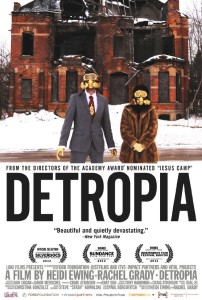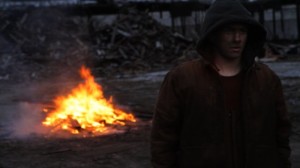Interview with Craig Atkinson, Co-producer/Cinematographer of Detropia

Detropia, a documentary currently being screened in select theaters across the country, is perhaps the most researched and poignant account of the fate of the Motor City. The narrative is chronicled by people who are living it every day. Beyond the beautiful cinematography, one should appreciate the lack of “talking heads.” The searing footage speaks for itself, as well as the first-person accounts of citizens who are deeply affected and deeply aware of where things stand, and how they came to be.
Produced by Loki Films principals Heidi Ewing and Rachel Grady, the documentary’s local connection separates it from others on the subject. Co-producer/cinematographer Craig Atkinson, a metro-Detroit native, spoke with CinemaNerdz about the filmmaking process, and how Detroit’s tale is a prognosis for the rest of America.
____________________________________________________________
CinemaNerdz: How did the story take shape during the filming process? Was the finished product what you intended to portray?
CRAIG ATKINSON: We started development in October 2009. In four days we met a group of incredible individuals and shot a trailer to raise funds (via a Kickstarter campaign.) We started editing about six months into the shooting, and we noticed these themes started to emerge – the middle class, the end of the manufacturing era, [and] the disproportionate distribution of wealth. So we decided to focus in and tell those stories as they emerge. You’re limited in minutes. If you tell too many stories they’ll be diluted.
CinemaNerdz: The film is doing very well on the festival circuit and won awards for editing at Sundance, as well as for cinematography at the Traverse City Film Festival. How did you capture some of the amazing images?
ATKINSON: Anytime people respond and can identify with what you’re feeling, especially when it’s something so close to home; it’s a great feeling. I had no idea the film would be so well-received.
I grew up in Royal Oak and taught in the Detroit Public Schools, so part of it is having the luxury of knowing the city so well and knowing what has been shot before. A lot of footage was shot out of my apartment window. Having the time invested makes a difference. Camera crews come in for a few months or weeks and get the same shots. I was able to get more diverse images.

A still from the film “Detropia.”
CinemaNerdz: You’re obviously familiar with the subject matter, but did anything surprise you during the process?
ATKINSON: It was surprising to see how aware lifelong Detroiters were of some of these issues. For instance, Tommy Stephens (a local lounge owner) was espousing ideas on the 2 percent, which is what the whole Occupy Wall Street movement was built on. They called it the one percent, but that was a year before the rest of the nation. Detroit has a lot to share with the rest of the country about where we may be headed.
CinemaNerdz: Many reports have done a great job focusing on the city’s problems. Not many talk about how the city can rebound, and it could be argued that Detropia was more of the same.
ATKINSON: That’s where the pulse was when we turned off the cameras (in 2010). Really, no solutions are being put forth yet that are really tangible. My thinking is, when the nation comes up with a solution and decides to shift into a new era of that, then Detroit will come back. Motown didn’t build the city. We especially were a one-trick pony. OK, we used to be a manufacturing class. If we’re going to be a creative class, or if we’re going to be a service class, then how does that translate to creating a strong middle class, because that sustains the country? It’s going to take collective thinking by the rest of the nation, not the nation looking to the cities. It’s not a matter of the city fixing itself.
CinemaNerdz: Have you and your partners considered revisiting the area and shooting a doc about the next phase?

A still from the film “Detropia.”
ATKINSON: We’ll see what the future holds. If someone has the budget to do a 12-part series, I’m ready! But we chose to do one thing well versus 1,000 things halfheartedly.
CinemaNerdz: And what is your hope for the film? What effect would you like for it to have on the viewer?
ATKINSON: It is having a festival life. Now we have the theatrical release, and it will air on PBS soon. So the sheer number of people who will have access to it jumps up in the millions over night. When you put your heart into something, you just hope a few 100 people will see it!
I want to stimulate the discussion a national scale. Not just say, “OK, the bailout worked,” but really look at it and ask, “Is the quality of life better? What improved? How are the people doing any better?” Get the brightest minds in the country talking about it and hopefully coming up with some solutions.
____________________________________________________________
See Detropia beginning September 14th, 2012 in select cities across the country!


